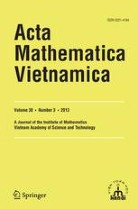
Acta Mathematica Vietnamica
- Volume 50
- Volume 49
- Volume 48
- Volume 47
- Volume 46
- Volume 45
- Volume 44
- Volume 43
- Volume 42
- Volume 41
- Volume 40
- Volume 39
- Volume 38
- Volume 37
- Volume 36
- Volume 35
- Volume 34
- Volume 33
- Volume 32
- Volume 31
- Volume 30
- Volume 29
- Volume 28
- Volume 27
- Volume 26
- Volume 25
- Volume 24
- Volume 23
- Volume 22
- Volume 21
- Volume 20
- Volume 19
- Volume 18
- Volume 17
- Volume 16
- Volume 15
- Volume 14
- Volume 13
- Volume 12
- Volume 11
- Volume 10
- Volume 9
- Volume 8
- Volume 7
- Volume 6
- Volume 5
- Volume 4
- Volume 3
- Volume 2
- Volume 1
GROWTH OF A CLASS OF COMPOSITE ENTIRE FUNCTIONS
JIANWU SUN
Abstract
In this paper, we obtain the following results:
Let $f_1, f_2$ and $g_1, g_2$ be four transcendental entire functions with $T(r, f_1) = O^{\ast}((\log r)^{\nu}e^{(\log r)^{\alpha}})$ and $T(r, g_1) = O^{\ast}((\log r)^{\beta})$ (i.e., there exist four positive constants $K_1, K_2, K_3$ and $K_4$ such that $K_1\leq \frac{T(r,f_1)}{(\log r)^{\nu}e^{(\log r)^{\alpha}}}\leq K_2$ and $K_3\leq \frac{T(r,g_1)}{(\log r)^{\beta}}\leq K_4$).
If $T(r, f_1) \thicksim T(r, f_2),$ $T(r, g_1) \thicksim T(r, g_2)$ $(r \to\infty)$, then
$$T(r,f_1(g_1))\thicksim T(r,f_2(g_2))\quad (r\to\infty, r\not\in E)$$
where $\nu > 0, 0 < \alpha < 1, \beta > 1$ and $\alpha \beta < 1$ and $E$ is a set of finite logarithmic measure.
We solved a problem due to C. C. Yang concerning the characteristic functions of the composite functions.


